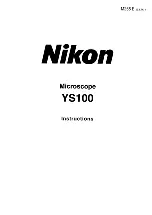Reviews:
No comments
Related manuals for SMZ168 Series

SZ61
Brand: Olympus Pages: 28

M-01617
Brand: Eschenbach Pages: 64

1172728
Brand: TOOLCRAFT Pages: 4

YS100
Brand: Nikon Pages: 47

USM
Brand: Lampert Pages: 12

LSM 880 with AiryScan FAST
Brand: Zeiss Pages: 41

3052-LED
Brand: Accu-Scope Pages: 8

BHTP
Brand: Olympus Pages: 23

CX41
Brand: Olympus Pages: 32

JM
Brand: Olympus Pages: 12

CAMCOLMS2
Brand: Velleman Pages: 77

MS-01L
Brand: premiere Pages: 2

MRJ-01
Brand: premiere Pages: 15

Digitalmicro Bowl
Brand: Bresser Pages: 102

MicroXplore 52177
Brand: Orion Pages: 5

630-1556
Brand: VWR Pages: 72

630-1550
Brand: VWR Pages: 84

SpectroPlate
Brand: Techkon Pages: 35

















